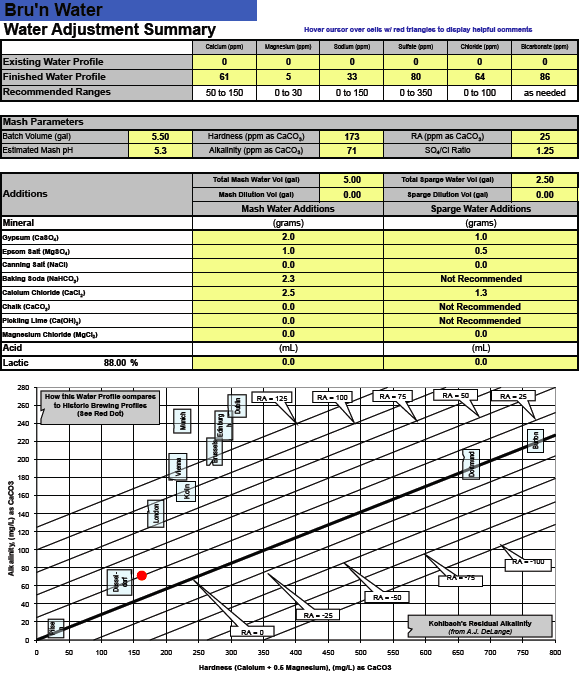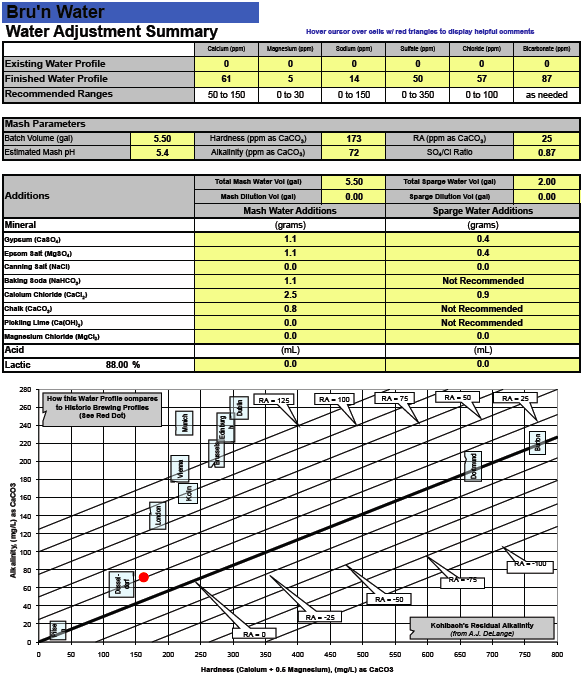JoppaFarms
Well-Known Member
- Joined
- Dec 27, 2012
- Messages
- 378
- Reaction score
- 31
Hey folks, so water is the next thing on my list of processes to improve my beer. This is a new recipe, so I won't have anything to compare the results to. I plan on using distilled water and adding salts to achieve the profile I need. Here is my recipe and attempt.
Recipe: AHBS W.W. Porter
Brewer:
Style: Robust Porter
TYPE: All Grain
Taste:
Recipe Specifications
--------------------------
Boil Size: 6.77 gal
Post Boil Volume: 5.67 gal
Batch Size (fermenter): 5.25 gal
Bottling Volume: 5.21 gal
Estimated OG: 1.052 SG
Estimated Color: 39.6 SRM
Estimated IBU: 33.0 IBUs
Brewhouse Efficiency: 72.00 %
Boil Time: 60 Minutes
Ingredients:
------------
Amt Name Type # %/IBU
7 lbs 12.0 oz Pale Malt (2 Row) US (2.0 SRM) Grain 10 71.3 %
1 lbs Chocolate Malt (350.0 SRM) Grain 11 9.2 %
12.0 oz Caramel/Crystal Malt - 60L (60.0 SRM) Grain 12 6.9 %
8.0 oz Caramel/Crystal Malt - 20L (20.0 SRM) Grain 13 4.6 %
8.0 oz Caramel/Crystal Malt - 80L (80.0 SRM) Grain 14 4.6 %
6.0 oz Black (Patent) Malt (500.0 SRM) Grain 15 3.4 %
0.75 oz Northdown [7.00 %] - Boil 60.0 min Hop 16 19.6 IBUs
1.00 oz Goldings, East Kent [7.20 %] - Boil 15.0 Hop 17 13.4 IBUs
1.00 oz Willamette [4.70 %] - Aroma Steep 0.0 mi Hop 18 0.0 IBUs
1.0 pkg Greenbelt (Wyeast #5609) Yeast 19 -
2.00 oz Coffee (Bottling 0.0 mins) Flavor 20 -
Mash Schedule: Single Infusion, Full Body, Batch Sparge
Total Grain Weight: 10 lbs 14.0 oz
----------------------------
Name Description Step Temperat Step Time
Mash In Add 5.00 gal of water at 164.3 F 156.0 F 60 min
Sparge: Batch sparge with 1 steps (2.50gal) of 168.0 F water
I used Bru'n Water spreadsheet and chose the "Brown Malty" water profile and made adjustments using Distilled water (i.e. zero for all minerals and 7.8 for pH). Does this look appropriate? According to the spreadsheet it appears that my estimated mash pH will be 5.3 which is a bit low, but it is in the range (5.2-5.5). Any help would be GREATLY appreciated!

Recipe: AHBS W.W. Porter
Brewer:
Style: Robust Porter
TYPE: All Grain
Taste:
Recipe Specifications
--------------------------
Boil Size: 6.77 gal
Post Boil Volume: 5.67 gal
Batch Size (fermenter): 5.25 gal
Bottling Volume: 5.21 gal
Estimated OG: 1.052 SG
Estimated Color: 39.6 SRM
Estimated IBU: 33.0 IBUs
Brewhouse Efficiency: 72.00 %
Boil Time: 60 Minutes
Ingredients:
------------
Amt Name Type # %/IBU
7 lbs 12.0 oz Pale Malt (2 Row) US (2.0 SRM) Grain 10 71.3 %
1 lbs Chocolate Malt (350.0 SRM) Grain 11 9.2 %
12.0 oz Caramel/Crystal Malt - 60L (60.0 SRM) Grain 12 6.9 %
8.0 oz Caramel/Crystal Malt - 20L (20.0 SRM) Grain 13 4.6 %
8.0 oz Caramel/Crystal Malt - 80L (80.0 SRM) Grain 14 4.6 %
6.0 oz Black (Patent) Malt (500.0 SRM) Grain 15 3.4 %
0.75 oz Northdown [7.00 %] - Boil 60.0 min Hop 16 19.6 IBUs
1.00 oz Goldings, East Kent [7.20 %] - Boil 15.0 Hop 17 13.4 IBUs
1.00 oz Willamette [4.70 %] - Aroma Steep 0.0 mi Hop 18 0.0 IBUs
1.0 pkg Greenbelt (Wyeast #5609) Yeast 19 -
2.00 oz Coffee (Bottling 0.0 mins) Flavor 20 -
Mash Schedule: Single Infusion, Full Body, Batch Sparge
Total Grain Weight: 10 lbs 14.0 oz
----------------------------
Name Description Step Temperat Step Time
Mash In Add 5.00 gal of water at 164.3 F 156.0 F 60 min
Sparge: Batch sparge with 1 steps (2.50gal) of 168.0 F water
I used Bru'n Water spreadsheet and chose the "Brown Malty" water profile and made adjustments using Distilled water (i.e. zero for all minerals and 7.8 for pH). Does this look appropriate? According to the spreadsheet it appears that my estimated mash pH will be 5.3 which is a bit low, but it is in the range (5.2-5.5). Any help would be GREATLY appreciated!


























![Craft A Brew - Safale BE-256 Yeast - Fermentis - Belgian Ale Dry Yeast - For Belgian & Strong Ales - Ingredients for Home Brewing - Beer Making Supplies - [3 Pack]](https://m.media-amazon.com/images/I/51bcKEwQmWL._SL500_.jpg)
































